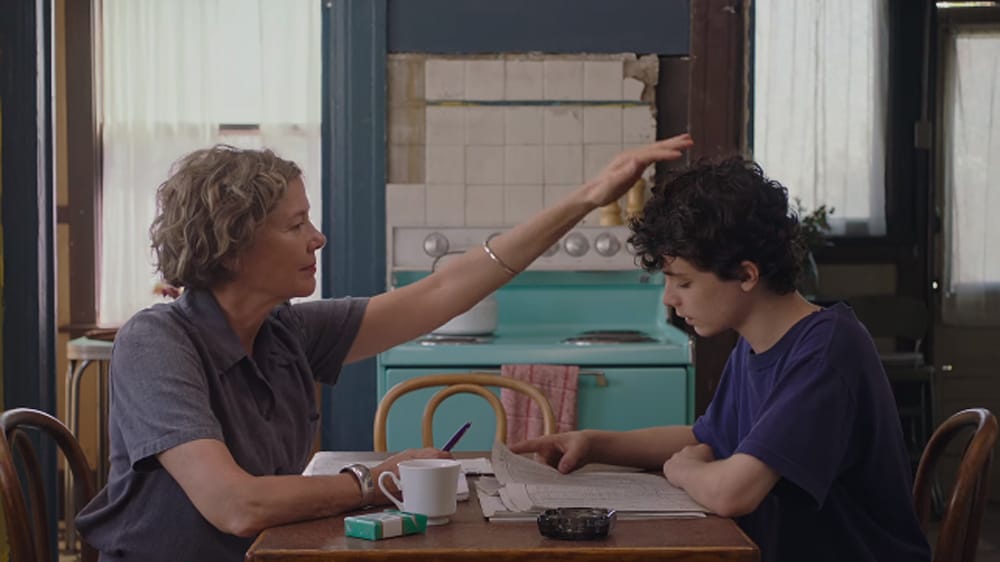
‘Time flies over us, but leaves its shadow behind.” – Nathaniel Hawthorne
One of the early images in 20th Century Women is of a Ford Galaxy, parked in a supermarket lot, burning in ferocious flames. “That was my husband’s,” gloomily says single mother Dorothea Fields, played by Annette Bening, who effortlessly commands the screen with her resolute gestures and Birkenstocks in one of her career-best performances. She is the chief of several multifaceted and shrewdly written heroines in Mike Mills’ latest; an opulently wisdom-filled follow up to his genuinely realized heartbreaker, Beginners.
It’s the summer of 1979 in Santa Barbara: post-Vietnam war, pre-Reagan, and during the mainstream rise of the punk rock movement. It’s a defining summer for Dorothea, who travels into her 55+ years of personal memories, and recounts the key moments in her life where that particular Ford Galaxy has played a part. Like that time she rushed her son Jamie (played by Lucas Jade Zumann, an impressive newcomer to watch) to the hospital. She just can’t put her finger on how the car suddenly burst into flames. “It wasn’t always old. It just got like that all of a sudden,” Dorothea coolly and pithily observes.
This set up serves as an evident metaphor for what we’re about to witness: fragments of multiple lives flashing right before the eyes of the audience, some of them challenged by a rapidly vanishing sense of invincibility. While those fragments might not visibly resemble our own recollections at first glance, they unmistakably draw from a human desire to affirm the ongoing meaning and significance of our lives, through the relationships we were born into and have built, and experiences, grand or minor, we’ve had. That’s why some of us invest time in meticulously organizing albums, scrapbooks, and shelves of family memorabilia, or fill up an old cigar box with random items of emotional significance. Or archive our every move on social media, speaking in more contemporary terms.
In that regard, watching 20th Century Women is like basking in the cozy, vintage smells of a splendid thrift store and browsing its history-filled aisles with sadness and respect, while wondering and worrying whether your own memorabilia will also end up in the mix one day. What 20th Century Women, an exquisite mother and son story at its heart, captures most accomplishedly is something cinema rarely manages to grasp. This brilliant film seems to know that for women (especially women “of a certain age,” for lack of a better phrase) it is not as much a matter of “whether,” as it is a matter of “when.”
Like women everywhere, the chain-smoking Dorothea (“they were healthy when she started and didn’t always cause cancer”) knows this well. In one scene, the stock market enthusiast and ex-aviator is confronted about the aging process of women through the words in a book: specifically, how we are viewed after our 40s and 50s, and the fact that society feels more comfortable with our sexual and intellectual invisibility than our unapologetic presence. She cooly says she doesn’t need a book to learn about herself. Mills, whose Beginners was an ode his father who came out as gay late in life, this time honors his mother thoughtfully, and via some strange cosmic extension womanhood at large, by demonstrating his deep understanding of the ways we, the women, engage with the passage of time differently than men. Not because we want to, but because we’re made to by the society that silently prefers to put us in our graves prematurely, well before our time comes.
Mills is never patronizing in this intimate pursuit, and he exemplifies his perspicacity further with two other key women in a film that moves back and forth in time swiftly through the characters’ melancholic voice over narrations. Julie (Elle Fanning, in a stunning performance as usual,) is a lost young woman wooed by her childhood friend Jamie, whom she sleeps with (literally, just sleeps next to but doesn’t have sex with) but doesn’t get involved with romantically. Unable to identify with her own therapist mother who insists on sending Julie to therapy groups, Julie spends a lot of time at Dorothea’s quaint Victorian home that seems to be under a never-ending renovation. Quietly rebellious and sexually liberated (important note: the film does not judge her for it,) Julie is one of the women an increasingly depressed and unhappy Dorothea turns to, when she finds she needs help with raising her son.
The other woman Dorothea brings on board is the vocally feminist, punk rock-haired Abbie (Greta Gerwig, who slips into the role with ease, and makes it fit her like a glove). A cervical cancer survivor and a tenant at Dorothea’s, Abbie takes Jamie under her expansive wings and contributes to his upbringing with the essential readings, music, and the hard-core feminist attitudes of the time. Already challenged by the idea of death, the artful Abbie chases immortality through creativity and decides to document her life with photographs of the daily objects she uses.
The only male figure in Jamie’s life is another occasional tenant (and contractor) of her mother’s, a slightly washed up handyman named William (Billy Crudup) whom Dorothea intermittently bonds with by listening to Black Flag and Talking Heads trying to understand what young people get from them. 20th Century Women is ingeniously costumed by Jennifer Johnson, who gives the film its realistic “gently worn and lovingly donated to a thrift store” look. Equally emblematic is Chris Jones’ production design, with a lived-in attention to detail glimmering on every corner. There is a generous amount of visual and intellectual wealth to unpack in Mills’ exquisite Women, where female lives are revered, wrinkles are earned, and the idea of a perfect future is astutely confronted.
